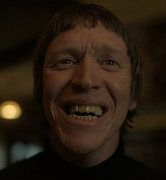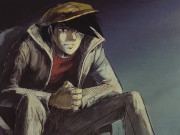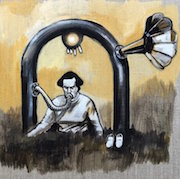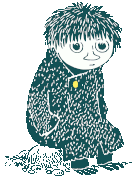|
One of the things I took away from the epilogue was how the time of the free range was over. The buffalos were all slaughtered, as were the Native Americans, and the digging of holes corresponded to the placing of the fencing that went on to subdivide the whole of the prairies. It was the end of the era and the beginning of a new, smaller, time. At the same time this passage invoked the imagery of the dance macabre that ended the Seventh Seal, which also evokes ending. Of course, over these signs of changing times is cast the shadow of the Judge, who says he will never die. e. and who did his own literal dance macabre at the end of the final chapter Would be cool to dig further into it because there is a lot more there but that is what memory digs up Bilirubin fucked around with this message at 01:27 on Mar 30, 2021 |
|
|
|
|

|
| # ? Apr 16, 2024 18:42 |
|
OPís review of blood meridian sort of reads like a Jack Keefe letter now that youíve finished you should reread the pages prior to the boyís joining of the glanton gang. ĎOnly now is the child finally divested of all that he has been. His origins are become remote as is his destiny and not again in all the world's turning will there be terrains so wild and barbarous to try whether the stuff of creation may be shaped to man's will or whether his own heart is not another kind of clay.í does this mean anything to you?
|
|
|
|
A nice Blood Meridian supplement is this lecture by Prof. Amy Hungerford from her video series she did at Yale. Blood Meridian Part 1 and Part 2. Talks about McCarthy's influence, his research, symbolism, context, themes, etc. She discusses the ending as well.
|
|
|
|
been awhile since I watched it but I think itís wrong to stray that far into a meta discussion about the creation and concept of the novel. especially since the theme of, say, free will, prevails through a lot of western literature itís cool but will only serve to confuse our bewildered op for supplementary reading, the angry parts of the Old Testament would be good. Jeremiah and Job in particular artism fucked around with this message at 13:55 on Mar 29, 2021 |
|
|
|
His writing of the scenery was the best part of the writing imo. Made getting between two spots in an empty expanse beautiful.
|
|
|
|
artism posted:OPís review of blood meridian sort of reads like a Jack Keefe letter "Jack Keefe is a headstrong, gullible, cheap, naive, self-centred, egotistical and uneducated rubeóbut he has a strong pitching arm." Lmao, a bit uncalled for I'd say. To be honest no, I don't understand that quote, didn't when I first read it, and I don't now. It seems like it may be related to the "theme" of the novel about how the wild west was a wild place, where man was free to release his true nature. And whether the environment created the men, or if all men would be like this in such a context. But then it says "or whether his own heart is not another kind of clay", and I'm lost. I just remembered i liked the scene where the judge goes "if it exists without my knowledge it exists without my consent". I was afraid he'd destroy the dinosaur bones they find at some point, luckily he didn't. Edit: The ending being about how the wild times are over and now is the time of civilization is interesting, thanks for the explanation. Of course as you say one has to decide whether men were as barbaric just because of the landscape they found themselves in, and if parceling the land is enough to change their ways. It reminds of some other western maybe with a similar ending. Unforgiven? Once upon a time in the west? Or maybe it wasn't even a western. But usually civilization arriving is cast in a positive light, BM shows what it relaly means. Edit 2: the yale lecture pt1 ends up with that sentence being put up for analysis, bur part 2 doesn't start with the conclusion, booo Mr. Nemo fucked around with this message at 23:17 on Mar 29, 2021 |
|
|
|
Yes, that's right, what is seen as "civilization" in the form of fenceposts delineating the American southwest, is in fact the harbinger of total destruction. The Judge is at least in part an avatar of the dominionist philosophy which will prove to be fundamental in the fall of humanity (yes, that's us). Edit: this is really cool, please give us more of your ideas. For a lot of us, we've been studying the book for long enough that a first impression is forgotten.
|
|
|
|
Mr. Nemo posted:To be honest no, I don't understand that quote, didn't when I first read it, and I don't now. It's about this being the era when man first understood that he could either choose to be master of the earth, or that he would be molded by it and made to submit to it, as all other species have. And the choice that we made, is embodied by the Judge.
|
|
|
|
|
OP, sorry. To add to what mde said, can we escape the natural order? Can we make decisions for ourselves or do we submit to a design? If so, whose? Or if you like, what? A deterministic worldview is presented and challenged throughout the book. Whether the judge is a force or something else is also fun to think about. I donít remember where but at some point the kid says he can think of Ďbetter waysí and yet heís one of the architects of this new, or very old, order.
|
|
|
|
If you want my "virgin" opinion then one more post before I continue the lecture and get more biased. But be warned my computer crashed and shut down the first time i started writing this post, it may have been trying to protect you. I was wondering about something, that probably has a simple explanation I missed, why did the judge try to kill the Kid after the Yuma attack. The priest i can get, there never was any love between them. But the kid? I don't remember any bad blood. Just out of pure evil could work, but there has to be something more. Which brings me back to the quote i mentioned earlier "if it exists without my knowledge it exists without my consent". What I gather is that somehow the kid managed to surprise the judge, and that enraged him. I'm coming from the, a bit surprising, fact that he didn't kill Toddvine and Brown. He simply exchanged with them, and let them be. They played the game as he expected, valuing gold, and then they died still playing the game. The kid instead decides to set off with the priest. But what I'm missing is the "temptation" scene with the kid, where the judge tries to make him comfort to his expectations. And it would go nicely with the "Satan" character the judge plays. Satan tempting jesus, etc. So I'm not left with much. Once the judge finds him in prison he even helps free the kid! My take there was that once the kid was at his mercy killing him wasn't fun, it was more entertaining for him to show him how much power he has. And then the priest disappears. Is there any significance to this? It's not like the priest was a moral character, riding with the gang and all. But once the kid becomes "good", or at least "better" by returning to civilization this character disappears. And a couple pages later the kids travels with a Bible and gets mistaken for a priest. There has to be something there. Did the judge kill the priest? Edit: I really really wished i could remember what i thought of the road when i was about 15, with a poorer grasp of english and when plot was even higher a priority than it now is for me. Those takes probably were scorching hot. At some point the book reminded me of 2666, but it's probably just superficial, regarding the repetitive descriptions of violence in a mexican landscape. Mr. Nemo fucked around with this message at 23:56 on Mar 29, 2021 |
|
|
Mr. Nemo posted:I just remembered i liked the scene where the judge goes "if it exists without my knowledge it exists without my consent". I was afraid he'd destroy the dinosaur bones they find at some point, luckily he didn't. This is another thing that European colonial explorers and settlers would actually do though. They would (and we still do) go into places to find animals or ruins unknown to us (but known to the locals), kill them/ dig them up and haul them back to London, in order to document, describe, and name them in scientific publications. The don't officially "exist" unless done so in this manner. Vast temples and burial grounds or art works or ecosystems were destroyed in this manner. What Judge Holden is doing in that scene is a biblical elevation of a Royal Society mandate
|
|
|
|
Mr. Nemo posted:I was wondering about something, that probably has a simple explanation I missed, why did the judge try to kill the Kid after the Yuma attack. The priest i can get, there never was any love between them. But the kid? I don't remember any bad blood. Just out of pure evil could work, but there has to be something more. I think you are more or less correct here. The kid is clearly set against the Judge from the beginning, and yet we see very clearly that....uh.... well. The Judge is perturbed by the existence, or the possibility, of the kid. He cannot sway him, in the end, and so he [redacted]
|
|
|
|
|
mdemone posted:I think you are more or less correct here. The kid is clearly set against the Judge from the beginning, and yet we see very clearly that....uh.... well. I never really thought about it this way during my previous readings, but this makes sense - the Judge is the law, bringing order to the savage land and people. The kid represents everything he opposes, wilful and independent. If he cannot be destroyed, he must be killed - or worse, consumed into him. Manifest destiny!
|
|
|
|
Hieronymous Alloy posted:There's always the paradox of tolerance issue. A better example for discussion is probably something like The Turner Diaries, which directly inspired the Oklahoma City bombings. Or a more borderline example might be this thread I had to gas recently because the poster was going on a cross-forum racistposting spree and even with a book that might be interesting in the abstract, in the particular you run into the Dave Chappelle problem: That must be dejecting as an artist, knowing that anything you write will be misinterpreted in the worst way possible by terminally online web cretins.
|
|
|
thehoodie posted:I never really thought about it this way during my previous readings, but this makes sense - the Judge is the law, bringing order to the savage land and people. The kid represents everything he opposes, wilful and independent. If he cannot be destroyed, he must be killed - or worse, consumed into him. Manifest destiny! At this point the Judge is also leading the Idiot around on a leash. Add in that element of being brought to heel, but also the sheer lunacy of the aspect of the scene to the outsider. I think this scene really benefits from contemplation.
|
|
|
|
|
Are the claims of plagiarism against Shokolov credible? It stinks to me of Cold War Propaganda. Edit: Seems to me that it probably is and that the Wikipedia page on him is a hitpiece. ToxicAcne fucked around with this message at 00:59 on Mar 31, 2021 |
|
|
|
ToxicAcne posted:That must be dejecting as an artist, knowing that anything you write will be misinterpreted in the worst way possible by terminally online web cretins. a true artist has the energy of a poster. they just throw stuff out there and refuse to be cowed by criticism. i think on an ideological level you have to accept that people are going to interpret what you create on a level that you didnít intend for, and aside from maybe disavowing those elements publicly, thereís not much you can do about it
|
|
|
|
Is there an audio version of The Iliad where everyone has Peter and the Wolf-like music cues everytime they're like Achilleus the swift-footed or Helen of the white arms or Agamemnon leader of men or Trojans breakers of horses? The little catch phrases are so cute and I guess were included to help keep every character straight in the original work. Also just read 10 pages of names of people who their fathers were and how many black boats they've got, usually 40. It was awesome
|
|
|
|
apophenium posted:The little catch phrases are so cute and I guess were included to help keep every character straight in the original work. The proper term for them is heroic epithets. They are indeed awesome and something I wish we still did. They serve a few purposes in the text. Keeping everyone straight is one. They also serve as quick characterizations and make the names flow with the verses' rhythm.
|
|
|
|
ToxicAcne posted:Are the claims of plagiarism against Shokolov credible? It stinks to me of Cold War Propaganda. even the wikipedia page provides way more evidence for his being the real writer than not despite giving stuff from the likes of Solzhenitsyn the time of day.
|
|
|
CestMoi posted:omeros is so good, and so's the peregrine I've just started reading this and holy hell, is it ever beautifully written
|
|
|
|
|
Another cool Iliad thing is just when I was becoming numb to dudes being laid low by bronze speartips someone's leg gets obliterated by a boulder and it was just brutal. I think this Homer chap is going places.
|
|
|
|
Hi thread I am interesting in discussing Sir Gawain and the Green Knight. I finished reading Simon Armitage's translation and immensely enjoyed it, but some bits of it are kind of baffling. I'm told that this is the appropriate place to discuss it. I feel like there's a huge amount of assumed cultural context that I'm missing, which is...expected, really, but it does make some of it weird. Anyways, so, when Gawain's in Castle Hautdesert and the lord makes the proposal to swap the winnings from his hunt tomorrow with whatever Gawain achieves during the day, what would Gawain have thought he'd be able to achieve? For the lord it's obvious what he'd swap (meat, stories) but for Gawain, he's basically expected to hang around and socialize for the day, so what form would he think his winnings would take when making the deal? Was generous gift-giving between high-class knights/nobles normal, and he'd be thinking in terms of that? Would he expect to be doing courtly romance, and he actually was down to give kisses/tokens/possibly sex back to the lord? Was he just too bound by "hey I promised to do what the host said, and he said this" to object? My sort of broad read on the whole situation is that he's trapped by his chivalric honor between "Can't say no to the host who I pledged to serve" and "Can't commit adultery, that's super duper not acceptable" so he accepts the bargin even on the second and third days, when he has some idea of how it'll go down, and then basically spends the day running out the clock on Lady Hautdesert. But it's also kind of baffling that he can't just tell Lady Hautdesert that adultery is super not okay and he's not down for it, especially on the second day when she basically goes from implying to directly saying "Yes I would like to bang you while my husband is away Gawain." Instead he goes into a sort of deflection, like "Oh I'm not actually all that great at love, you know, you're probably better than me haha" and basically runs out the clock again. Was it considered unchivalric for a man to directly refuse what is, basically, a sinful and presumably unacceptable proposal from a woman? Like...what's the deal here, it's not like he's going to insult her for implying she wants to do a bad thing when she's basically tell him "yes I would like to do one adultery please."
|
|
|
|
You can take multiple explanations, one is that it would be a faux pas somehow and that Gawain is just so chivalric he couldn't possibly impute bad motivations on woman like Lady Bertilak (but then what explains his anti-woman rant at the end of Fitt V) ... the other is that he is himself tempted, and blames her later on for him being tempted. And that his conversations have to navigate a dangerous path in the way that usually when the knight rides forth he navigates, episodically, various dangers like a big boar or something. Also consider the role of Lord Bertilak/The Green Knight in all this: he's shown to have known everything by the end. But the game relies upon a sort of pretence of not knowing where the kiss comes from, or indeed that a kiss would come. The whole thing ends up being a narrative scenario to enable a man to kiss both a married man and a married woman, in a sexual way. (Also think about how these scenes are interspersed with Bertilak catching his prey) The basic thing is that exploring sex is basically encoded into the Arthurian romance. Taboo sex is there in none-Arthurian romances and Marie de France's lais, but there's a reason the Victorians got super into the legend, and it's because it was a sanctioned way of talking about sex. Tristan and Isolde, Lancelot and Guinevere. SGGK comes to prominence after though you could argue its fame is due to similar things. SGGK is about courtesy, yes, but also about temptation--there is always temptation, and the most perfect people can yield to it. And also think about narrative complexity of the poem, it's because it requires almost but not quite getting the whole picture every time you read it. These are stories to be read, remembered and repeated, presumably in a collective setting.
|
|
|
|
Bilirubin posted:I've just started reading this and holy hell, is it ever beautifully written the part where they find the giant butterfly under the ice and eat it is cool as heck
|
|
|
|
Jrbg posted:You can take multiple explanations, one is that it would be a faux pas somehow and that Gawain is just so chivalric he couldn't possibly impute bad motivations on woman like Lady Bertilak (but then what explains his anti-woman rant at the end of Fitt V) ... the other is that he is himself tempted, and blames her later on for him being tempted. And that his conversations have to navigate a dangerous path in the way that usually when the knight rides forth he navigates, episodically, various dangers like a big boar or something. With regards to Gawain not imputing bad motivations to her, it seems like he correctly intuits her motivations but is he himself constrained by whatever mysterious rules he's playing by to never directly turn her down. Like in lines 1770-1773 the narrator says that she's trying to get him either to say yes, or to loudly refuse her, and that he views either of those as a failure, so he just keeps politely deflecting. Certainly there is a very real sense of danger. I did kind of consider the role of Lord Bertilak, but my probably hilariously anachronistic read on that is he's actually fine with Gawain banging his wife just so long as he himself gets to bang Gawain? He seems exceptionally stoked whenever Gawain kisses him, and given the way he's very intentionally set up the game, I don't think either adultery or gay sex would be taboo to him, especially given his framing as a less Christian, more pagan avatar of nature or, like, whatever. But, then, thinking about SGGK as a period exploration of sex makes me wonder if that's just incredible back-projection and the takeaway from a period reader would be totally different.
|
|
|
|
We also know basically nothing about the Gawain poet IIRC. They could have been a gay man themselves for all we know, or someone with repressed gay desires that came out with writing SGGK or whatever. I think what's interesting about that poem is that its hard to find a single explanation that neatly explains everything about it.
|
|
|
|
Currently going through The Painted Bird by Jerzy Kosninski on a friend's recommendation and man, it's not that I can't take brutality and violence but there's something so numbing about this story. Perhaps that's the point but it almost reaches a degree of absurdity to the point that every single person the narrator encounters is either a violent brute or is unceremoniously killed by violent brutes. On one hand, that's the Holocaust for you, but I feel like there's no sign of light or humanity anywhere to be found and it's less that it's a bummer more that it's frustrating in its nihilism. I dunno, I think about Night as a counterexample and Wiesel has a way of highlighting the humanity within the bleakness, which has the effect of making everything even more soul crushing.
|
|
|
|
Hell yes, Sir Gawain. One of my favorites from a Medieval course I took. I remember chivalric stuff being super horny, but it's all tightly restrained. I don't have much to add, other than to say this is a cool discussion, and maybe his being Green has a lot to do with spring and fertility?
|
|
|
|
The history thread in A/T convinced me to read Don Quixote and I guess this is the classics thread, so I'm here to post. I can absolutely see why this was one of the first longform prose fiction books to take off big time after the printing press started spreading. It's funny as hell, and irreverent of being well-read in a way that must have appealed to the middle class consumers who could suddenly afford frivolous books, but might not know all the older books that Cervantes is telling them not to waste their time with. I'm always a fan of the found fiction metanarrative--for example, Cervantes ends chapter 9 on a cliffhanger and apologizes to the reader that the notes detailing Quixote's life end there; chapter 10 begins with an account of how he found the continuation of the story. I mostly wanted to start because I'm a history buff (nearly all the books I read are history nonfiction) and was interested in it as a primary source on how early modern people viewed the transition from the middle ages to their own period, but I'm extremely pleased that I get such a delightful read at the same time.
|
|
|
|
Has anyone here read the Posthomerica? I was thinking of following up the Iliad with it.
|
|
|
|
cheetah7071 posted:The history thread in A/T convinced me to read Don Quixote and I guess this is the classics thread, so I'm here to post. I can absolutely see why this was one of the first longform prose fiction books to take off big time after the printing press started spreading. It's funny as hell, and irreverent of being well-read in a way that must have appealed to the middle class consumers who could suddenly afford frivolous books, but might not know all the older books that Cervantes is telling them not to waste their time with. I'm always a fan of the found fiction metanarrative--for example, Cervantes ends chapter 9 on a cliffhanger and apologizes to the reader that the notes detailing Quixote's life end there; chapter 10 begins with an account of how he found the continuation of the story. i am hesitant to recommend a pale fire as babbyís second big book, but itís also a stone cold classic with a found narrative device
|
|
|
|
Just finished Kim Scott's Taboo as part of my "reading writers of color 2021" challenge. Wow, unbelievable! I love when a book can make you smell the dust and the waterholes of its natural settings. Using that sudden evocation of nature as a device to show when the Noongar group was fleetingly/stumblingly getting back in touch with their ancestry, and when nature was the only true thing left behind for them to understand their great loss, was really effective too. But I think the most remarkable part was how the passing-on of "the old language" and the old people sharing words and expressions with the young people was the majority of their connection with each other, but the author used almost no actual Noongar words, just wrote "He said the old word for xyz." Felt like there was something being kept secret and passed along, something that if it were written and seen by outsiders would be diminished. In the afterword, Scott writes "There is little literal Noongar language in Taboo. I would have it speak to a wider audience and do more than posture difference." His mind...................
|
|
|
|
God help me, the end of the Ďbiographical reminiscencesí of At Swim, when the uncle gives him a watch, hits me in the most sentimental way. Almost exactly like The Dead. But the best part of the book, ĎArise, Sir, till I inflict twin nipple-hurts with the bevel of my nailsí
|
|
|
|
I donít get the praise for Klara and the Sun and suspect the authors reputation is the primary reason it has gotten so much attention. It was originally conceived of as a childrenís book and it shows in the writing, which is plain, and the main characterís perspective, which is essentially that of a simple minded child If it is meant to be some kind of allegory of the way the servant class is treated by the wealthy, I can read novels of much greater sophistication that feature human characters that live the experience, by authors whose personal backgrounds bring greater credibility to the depictions of those experiences A robot is taken for granted. Thatís the story. It does nothing for me My biggest complaint is that the writing itself is so bland. This is why books written from a childís perspective so often donít work blue squares fucked around with this message at 18:48 on Apr 11, 2021 |
|
|
|
I read Edward Albeeís The Goat, or Who Is Sylvia, and itís the best play about bestiality Iíve read. Itís really funny and outrageous, but also neurotic and is just as much about the limitations of communication as it is about infidelity and socially-constructed taboos and how intangible morality is since it changes with each person, and an interesting emphasis on personal shame vs social/external shame. It managed to hit that sweet spot with reading plays where it would be exhilarating to watch and/or to perform.
|
|
|
Franchescanado posted:I read Edward Albeeís The Goat, or Who Is Sylvia, and itís the best play about bestiality Iíve read. The Zoo Story is one of my favourite plays ever. Albee was an amazing playwright
|
|
|
|
|
blue squares posted:My biggest complaint is that the writing itself is so bland. This is why books written from a childís perspective so often donít work a book from a child's POW that does work is The Road to the World's End by Sigurd Hoel.
|
|
|
|
Franchescanado posted:I read Edward Albeeís The Goat, or Who Is Sylvia, and itís the best play about bestiality Iíve read. How do you tolerate that feeling of exhilaration knowing that now is possibly the worst time for theater since Puritan times? Not trying to be a killjoy rear end in a top hat, I am legitimately curious because it is something I struggle with.
|
|
|
|

|
| # ? Apr 16, 2024 18:42 |
|
Well, I've started through my recommendations from this thread and just got through Han Kang's absolutely brutal The Vegetarian. I mean I was expecting violent metaphors for societal conformity and patriarchy but drat that book is visceral. Very good but a hard read. Though it still has that weird tendency of modern fiction of almost robot-like, distanced characters. Definitely works for the theme but still has that Brechtian feel. This essay goes into less successful versions. https://thebaffler.com/salvos/im-not-feeling-good-at-all-bergman It reminded me of Charlotte Wood's The Natural Way of Things as a great piece of modern feminist horror that I would have a hard time picking up again. As for plays, I definitely want to pick up some Albee after hearing about his unsuccessful attempt to adapt Lolita from the Lolita Podcast. I have been reading plays more (always meant to see them live and planned to in 2020 and welp) though Slave Play I found underwhelming, written way too much for a pat yourself on the back Broadway audience (probably why it did so well).
|
|
|































